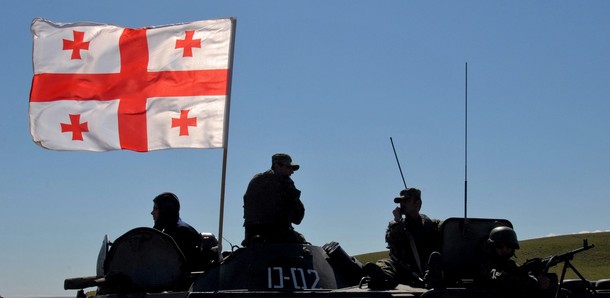
From Matthew Czekaj, the New Atlanticist: It should now be crystal clear: Georgia no longer wants a Membership Action Plan (MAP) for NATO accession. But it still expects to become a member of the Alliance.
Georgian Deputy Prime Minister and State Minister for Euro-Atlantic Integration Giorgi Baramidze said as much on April 7, following his meeting with NATO Secretary General’s Special Representative for South Caucasus and Central Asia James Appathurai. Baramidze confidently remarked,“In fact we have more than we were expecting from the NATO Bucharest summit – we have the Annual National Program and NATO-Georgia Commission, which informally is referred in NATO as ‘MAP plus’ mechanism. We do not expect those mechanisms to be changed, because there is no need for that; Georgia has everything required for continuation of democratic and defense reforms in order to become a NATO member.”
The obvious clarification that needs to be highlighted here, of course, is that while Tbilisi no longer considers receiving MAP a national priority, the country still actively pursues NATO membership as a strategic goal. As Baramidze noted, pushing for MAP has become politically superfluous to Georgia’s broader accession process.
In other words, Georgia is now under the impression – presumably based on how it understands the argument it is hearing directly from NATO – that it will be able to join without ever being granted MAP because its participation in the Annual National Program (ANP) and the NATO-Georgia Commission (NGC) serves as a workable MAP substitute (“MAP plus” as it is allegedly referred to at NATO). Thus, Georgia believes it was already given MAP in everything but name, and will use it to its full potential. Baramidze’s words represent a culmination of the evolution in Georgia’s views on the matter. …
While he accepts that Georgia will never get MAP, Baramidze makes it clear that Alliance membership is still fully within reach for Tbilisi. Notably, the European Integration Minister announced that, with continuing hard work in the areas of democracy and defense reform, Georgia should be “technically” ready to join NATO in “two to three years. …”
Georgia will probably have to sign a comprehensive peace treaty with Russia – perhaps one that simultaneously resolves the status of Abkhazia and South Ossetia – or, at a bare minimum, normalize its relations with Moscow to the same level as Russia’s relations with Estonia. The latter point is especially important if Tbilisi wishes to convince other NATO allies that it will be less problematic inside the Alliance than if it remains outside of it. The prospects for an amicable peace between Moscow and Tbilisi, let alone the resolution of Georgia’s frozen conflicts, remain slim for the foreseeable future, however. Consequently, Georgia will be unlikely to join NATO even if it can prove its technical readiness.
Matthew Czekaj is a research associate with the Atlantic Council’s International Security Program. (photo: Nina Shlamova/AFP)
Image: georgia-nato-exercises.jpg
